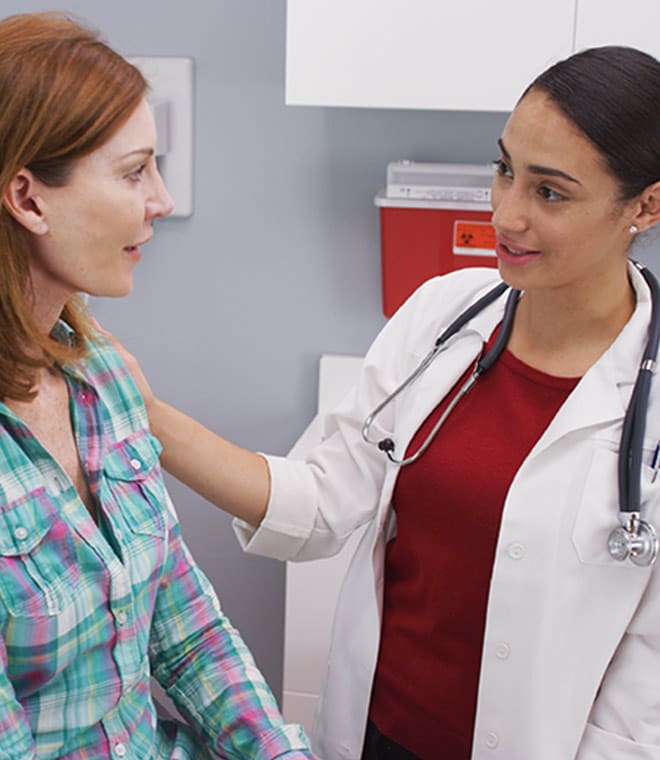Health
Menopause vs. perimenopause: What’s the difference?
By Patricia Ann Convery, MD, Fellow, American College of Obstetrics and Gynecology Mar 24, 2025 • 5 min
Menopause and perimenopause are natural stages of aging for women. Although they are closely connected, they refer to two different stages of life. Understanding the differences between the two can help you better anticipate what you may experience as you grow older.
What is menopause?
The end of a woman’s childbearing years is known as menopause. This is when a woman no longer menstruates and stops releasing eggs from her ovaries. Not all women reach menopause at the same age. For women in the United States, the average age is approximately 52.
What is perimenopause?
The time frame that leads up to menopause is called perimenopause. During this stage of life, the body makes the transition into menopause.
What is the difference between menopause and perimenopause?
Although perimenopause leads to menopause, these are two different life stages. Some differences include:
- Timing and duration: Perimenopause typically begins between ages 45 and 55, but it can start developing as early as your mid-30s or as late as your mid-50s. Generally, perimenopause lasts as long as 14 years, but the average duration is 7 years.
You can consider yourself entering the menopause phase when you’ve gone without a menstrual period for 12 months in a row and there is no medical condition causing the lack of periods. You can think of menopause as the finish line of a race and perimenopause as the racecourse. After you cross the finish line, you enter the postmenopausal phase, which lasts for the rest of your life. - Menstrual periods: During perimenopause, you will likely notice changes in your menstrual periods. The duration of and the time between periods may vary or be different from what you experienced before perimenopause. Bleeding can also be heavier or lighter compared to periods in the past. Some people may also experience spotting between menstrual periods. As you transition further into menopause, you may have fewer periods and go months without menstruating.
Menopause marks the end of menstruation. Once you reach menopause, you no longer have periods. - Fertility: During perimenopause, ovulation often becomes more irregular. However, it is possible to become pregnant during this stage. That said, people who try to get pregnant during perimenopause may have a more difficult time because of irregular ovulation and the quality of eggs remaining in the woman’s ovaries. In most cases, you should continue to use birth control throughout perimenopause if you're sexually active and don't wish to become pregnant.
Once the body has progressed into menopause, your ovaries stop releasing eggs. As a result, it is highly unlikely that you will become pregnant from sexual intercourse. However, some postmenopausal women do become pregnant successfully with the help of fertility medications and the use of egg donors or eggs that were previously frozen. - Symptoms and body changes: During perimenopause, certain symptoms typically associated with menopause may begin. These include:
- Breast tenderness
- Changes in sex drive
- Headaches
- Hot flashes
- Difficulty concentrating
- Dry eyes
- Dry skin
- Hair thinning or hair loss
- Increased need to urinate
- Irritability
- Mood swings
- Muscle and joint pain
- Night sweats
- PMS symptoms that are more severe
- Rapid heartbeat
- Sleep problems
- Vaginal dryness
- Weight gain or a change in body fat distribution
The severity of and duration of symptoms varies. Some women may only experience one or two signs of perimenopause. Once you reach menopause, symptoms, like hot flashes, may persist for up to 10 years. However, in most cases, they gradually subside within a few years after menstruation stops. Some changes, like vaginal dryness, can continue throughout life.
If you believe you’re experiencing symptoms of perimenopause or menopause, talk to your healthcare provider. In addition to helping you determine if you’re in one of these life stages, they can recommend treatments and lifestyle changes that can help you manage the symptoms typically associated with perimenopause and menopause. Some effective treatments can include over-the-counter menopause products.
Updated by Rebeca Thomas, RN, BSN, March 2025.
Sources:
- https://my.clevelandclinic.org/health/diseases/21608-perimenopause
- https://healthtalk.unchealthcare.org/can-you-get-pregnant-during-perimenopause/
- https://my.clevelandclinic.org/health/diseases/21841-menopause
- https://www.womenshealth.gov/menopause/menopause-basics#2
- https://www.womenshealth.gov/menopause/menopause-symptoms-and-relief
- https://my.clevelandclinic.org/health/diseases/21837-postmenopause
- https://www.nia.nih.gov/health/what-menopause
- https://my.clevelandclinic.org/health/diseases/21138-premature-and-early-menopause
- https://www.merckmanuals.com/home/women-s-health-issues/menopause/menopause




